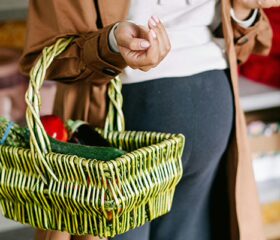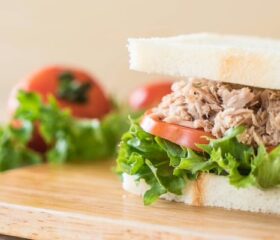Which Cheeses Are Safe to Eat While Pregnant?
One less enjoyable part of pregnancy is having to temporarily say goodbye to some of your favorite foods, which may include many cheeses.

If you’re worried about giving up Gouda, you’ll be happy to know you don’t have to cut out cheese entirely when you’re pregnant.
Cheese can be a nutritious and satisfying part of your pregnancy diet as long as you know which types to choose and which to avoid. Let’s break it all down, from why pasteurization matters to which cheeses are safe to pair with pickles at 2 am.
Can you eat cheese while pregnant?
Yes—luckily for all the cheddar-heads out there, you can safely enjoy certain varieties of cheese when you’re pregnant.
As long as the cheese you eat is pasteurized (more on this below), it should be safe for you to eat.
Why are some cheeses off-limits during pregnancy?
Cheese sometimes gets flagged as a food to avoid during pregnancy because of the risk of listeriosis, a rare but serious infection caused by a bacteria called Listeria monocytogenes. 1 When you’re pregnant, you’re about 10 times more likely than others to get sick from listeria. 1
What are the risks of listeriosis during pregnancy?
Listeria infections can have serious consequences for your baby. They put her at risk of miscarriage, stillbirth, premature birth, and newborn infections. 2
According to the Centers for Disease Control and Prevention (CDC), about 1,600 people in the United States get sick from listeria each year, and around 260 of those cases are fatal. 3 Notably, pregnant Hispanic women are more at risk due to the popularity of certain cheeses in their diets, like queso fresco and cotija. 1
Which cheeses are safe and unsafe during pregnancy?
You’ve got more cheesy options than you might think. Some cheeses are especially low-risk because of their lower moisture content or how they’re processed.
Check out the table below to learn which cheeses are usually safe, which to approach with caution, and which you should avoid entirely when pregnant: 4 5 6
| Cheeses that are safe | Cheeses to approach with caution | Cheeses to avoid |
|---|---|---|
| Pasteurized hard cheese, such as: - Cheddar - Parmesan - Swiss - Gouda - Romano Prepackaged & refrigerated pasteurized cheese |
Unpasteurized hard cheese Pasteurized soft and semi-soft cheese, e.g.: - Mozzarella - American - Provolone - Monterey Jack - Colby - Cottage cheese - Ricotta Deli-sliced & unpasteurized soft cheese heated to 165°F Cheese from farmers’ markets Imported cheeses |
- Brie - Camembert - Roquefort - Gorgonzola - Blue cheese - Queso fresco - Queso blanco - Panela - Cotija - Soft goat’s cheese - Unheated deli-sliced cheeses - Unheated and unpasteurized soft cheese |
This list is a general guide, not a completely exhaustive list. There are a few factors that affect how safe cheese of all types is for pregnant women, such as:
- How the cheese is handled and stored
- Where the cheese comes from (e.g., imported cheeses may not follow US pasteurization rules)
- How the cheese is prepared (i.e., heated or unheated)
If you’re ever unsure whether your favorite varieties of cheese are safe to eat, chat with your doctor first.
You should also check whether the cheese you’re considering is on the list of food recalls, market withdrawals, and safety alerts maintained by the US Food and Drug Administration (FDA) in case any normally safe cheeses put you at risk of listeria exposure.
Why pasteurization for cheese is important
As mentioned, you should generally opt for pasteurized cheese when you’re pregnant.
The pasteurization process involves heating food (in this case, the milk used to make cheese) to kill harmful bacteria like listeria. 7 Most cheeses sold in the US, especially in regular grocery store dairy aisles, are pasteurized and perfectly safe to enjoy.
Check the label to see if a particular type of cheese—or any other dairy product, for that matter—is pasteurized, especially when shopping at delis, farmers’ markets, or specialty cheese counters.
Is pasteurized cheese always safe?
Even pasteurized cheese can become unsafe if it’s handled alongside unpasteurized products or other contaminants like raw meat (think of shared cutting boards or knives). 8
Moreover, fresh soft cheeses made from pasteurized milk (such as fresh mozzarella) can also get contaminated during the cheese-making process, so you should be cautious with those varieties. 9
Can you ever eat risky varieties of cheese?
Certain riskier varieties of cheese (e.g., deli sliced cheese or unpasteurized soft cheese) can be safe to eat if you heat them until they reach an internal temperature of 165°F. If they harbor listeria, the cooking process will kill it.
That being said, you should still avoid mold-ripened cheeses with a rind (e.g., Camembert or Brie), soft goat’s cheese, and soft blue cheeses (e.g., Danish blue, Gorgonzola, or Roquefort) entirely. 4
What to do if you think you ate unsafe cheese
If you realize after the fact that you ate a soft or imported cheese and you’re not sure whether it’s pasteurized, don’t panic. Listeria infections are rare, and the odds are in your favor.
Call your doctor if you notice the telltale symptoms of listeriosis during pregnancy, like a fever, muscle aches, diarrhea or stomach cramps, headaches, or a stiff neck and confusion (indicative of severe cases). 2 Your doctor might suggest getting a blood test or taking preventive antibiotics. 10
Listeriosis often doesn’t present symptoms
Symptoms of listeriosis can appear anywhere from 1 to 70 days after eating contaminated food, and it’s also possible you won’t actually feel sick at all. 11 However, the bacteria could still affect your baby even if you’re asymptomatic, so contact your doctor if you think you ate an unsafe variety of cheese. 6
What are the benefits of eating (safe) cheese during pregnancy?
As long as you opt for safe varieties, cheese is a great dietary choice during pregnancy. Besides being delicious, it has plenty of nutritional benefits. It’s an excellent source of calcium, which supports your baby’s growing bones and teeth, and protein, which helps build your baby’s cells and tissues. 12
The US Department of Agriculture (USDA) recommends three servings of dairy daily when you’re pregnant, including cheese, milk, and yogurt (ideally low-fat options). One serving of cheese equals about one and a half ounces, which means a piece roughly the size of your thumb. 13
Not feeling up to a full meal? Cheese can serve as a great complement to other healthy pregnancy snacks. Try grated cheddar on bland toast or a creamy cheese sauce over veggies, especially during the first trimester, when morning sickness (nausea) and pregnancy-related food aversions often hit hard.
Final thoughts
Breathe a sigh of relief—cheese can absolutely be a part of your pregnancy diet. As long as you stick to pasteurized options, carefully read the labels, and practice proper sanitation, you can load up on grilled cheese and nachos (in moderation, of course).
Article Sources
- U.S. Food and Drug Administration. "Listeria (Food Safety for Moms-to-Be)" Retrieved September 9, 2025.
- Centers for Disease Control and Prevention. "Symptoms of Listeria Infection" Retrieved September 9, 2025.
- Centers for Disease Control and Prevention. "About Listeria Infection" Retrieved September 9, 2025.
- Tommy’s. "Foods to avoid in pregnancy" Retrieved September 9, 2025.
- Centers for Disease Control and Prevention. "Safer Food Choices for Pregnant Women" Retrieved September 9, 2025.
- Journal of Perinatal Medicine. "Listeriosis in Human Pregnancy: a systematic review" Retrieved September 9, 2025.
- U.S. Food and Drug Administration. "Food Safety and Raw Milk" Retrieved September 9, 2025.
- Food Safety and Inspection Service. "Listeria Questions and Answers" Retrieved September 9, 2025.
- Restored CDC. "Listeria Outbreak Linked to Queso Fresco and Cotija Cheese - February 2024" Retrieved September 9, 2025.
- Obstetrics & Gynecology. "Listeriosis in Pregnancy: Diagnosis, Treatment, and Prevention" Retrieved September 9, 2025.
- U.S. Food and Drug Administration. "Listeria (Listeriosis)" Retrieved September 9, 2025.
- WIC Works Resource System. "Eye on Nutrition: Calcium" Retrieved September 9, 2025.
- MyPlate. "Pregnancy and Breastfeeding" Retrieved September 9, 2025.







